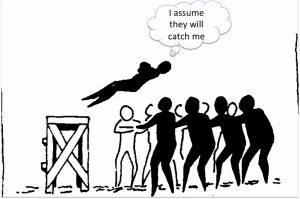
We make assumptions every day. Some of them are accurate. Others are not. Assumptions occur when there is an absence of complete information. Such is the case at just about every emergency scene you respond to. Let’s explore how we make assumptions.
The Assumption Cliché
T here is an old saying that if you assume, you make an ASS out of U and ME (ASSUME). This statement is most likely to be offered after facts have proven an assumption to be incorrect. It’s easy to see, after the fact, where an assumption has gone astray.
here is an old saying that if you assume, you make an ASS out of U and ME (ASSUME). This statement is most likely to be offered after facts have proven an assumption to be incorrect. It’s easy to see, after the fact, where an assumption has gone astray.
Guessing
An assumption is a mental guess or estimate. In the absence of complete information you are forced to fill in the missing information with your best guess. This guess is based on your collective knowledge (training, experience and an assessment of the current situation). The more training and experience you have and the better your assessment of the current situation, the more likely your assumptions are to be accurate (or close to accurate). Conversely, the less training and experience you have, the less likely your assumptions are to be accurate.
Satisficing (accept an available option as satisfactory)
It the absence of complete information, you are sometimes forced to make estimates. These estimates are, again, based on training, experience and a situational assessment. The more experience you have, the more you can rely on intuition to help you make your estimates. However, it is important to note that intuition can be inaccurate (or perhaps stated another way, not precise).
You can also develop shortcuts that can help you estimate. Making predictions that are “close enough” is known as satisficing. In the absence of time to complete a thorough assessment by gathering and analyzing ALL the available information, you may be forced to estimate or satisfice.
Here’s an example. Without the aid of a calculator and without working the problem out on paper, quickly estimate your answers to the following math problems:
1): 1,000 x 9: ________
2): 13 x 15:________
3): 241 x 373:_______
 Chances are, the first problem was easy to guess a precise and accurate answer. The second problem likely presented a little more challenge yet you probably were able to estimate a response that was relatively close. You may have found your estimate of the third answer to be significantly incorrect.
Chances are, the first problem was easy to guess a precise and accurate answer. The second problem likely presented a little more challenge yet you probably were able to estimate a response that was relatively close. You may have found your estimate of the third answer to be significantly incorrect.
The more complex a problem, the more you may tend to guess incorrectly. Your satisficed response may be “good enough” but way off the mark. Under time compression, with changing conditions, there may not be enough time to do the math on paper (or with a calculator). So you guestimate a response and assume you are close enough.
Rich Gasaway’s Advice
 Realize that when you are under stress and time compression, it can be easy to make assumptions because there (seemingly) just isn’t enough time to gather all the information needed to assure accuracy.
Realize that when you are under stress and time compression, it can be easy to make assumptions because there (seemingly) just isn’t enough time to gather all the information needed to assure accuracy.
In the absence of facts, the brain has a natural tendency to “fill-in” the missing information with assumed information. This is especially true when you are under stress and gripped by a sense of urgency to act.
It can be very helpful to bring awareness of your assumptions to a conscious level by asking yourself: “Is my understanding of what is happening based on facts or on assumptions I’ve made because I don’t have all the facts?” When you raise this question you may be surprised, even disturbed, by how much you assume to be true and accurate but is actually unsupported by facts.
Operating at emergency scenes where conditions are changing rapidly and where it can be difficult, if not impossible, to gather factual information in a timely manner, first responders often are required to rely on assumptions.
Some teachers of decision making theory assert that best decisions are made with facts and the decision makers should always base their decisions on factual information and never rely on assumptions. This is a great theory, but has little practicality in the real world.
Assumptions can, in part, be based on personality traits as well. An inherently pessimistic person may lean toward making pessimistic assumptions (they “fill-in” the missing information with the assumption of a poor outcome). Likewise, an inherently optimistic person may lean toward making optimistic assumptions (they “fill-in” the missing information with the assumption of a positive outcome). Knowing which way you tend to view the world can be helpful in understanding how your assumptions will lean.
In general, first responders tend to lean toward optimistic outcomes, not because of personality, but because of their inherent ambition to improve outcomes. First responders train hard to make problems better when they arrive at emergency scenes. This may lead to assumptions that conditions are not as bad as they may appear or that conditions are improving when, in fact, they are not.
Action Items
 Discuss an incident where assumptions caused issues with situational awareness that, in turn, may have contributed to a close call, a near-miss or a casualty event.
Discuss an incident where assumptions caused issues with situational awareness that, in turn, may have contributed to a close call, a near-miss or a casualty event.- Discuss an incident where assumptions strengthened situational awareness and, in turn, contributed to a good outcome.
- Discuss strategies for overcoming challenges with how assumptions can flaw your situational awareness.
_____________________________________________________
If you are interested in taking your understanding of situational awareness and high-risk decision making to a higher level, check out the Situational Awareness Matters Online Academy.
CLICK HERE for details, enrollment options and pricing.
__________________________________
Share your comments on this article in the “Leave a Reply” box below. If you want to send me incident pictures, videos or have an idea you’d like me to research and write about, contact me. I really enjoy getting feedback and supportive messages from fellow first responders. It gives me the energy to work harder for you.
Thanks,

Email: Support@RichGasaway.com
Phone: 612-548-4424
Facebook Fan Page: www.facebook.com/SAMatters
Twitter: @SAMatters
LinkedIn: Rich Gasaway
YouTube: SAMattersTV
iTunes: SAMatters Radio


Pingback: Blogging for Situational Awareness Users and Learners | Situational Awareness